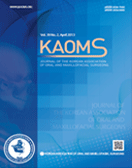Journal of the Korean Association of Oral and Maxillofacial Surgeons
- P-ISSN2234-7550
- E-ISSN2234-5930
- SCOPUS, KCI, ESCI
 ISSN : 2234-7550
ISSN : 2234-7550
Guidance and rationale for the immediate implant placement in the maxillary molar
Mi Young Eo (Seoul National University)
Ju Young Lee (Seoul National University)
Hoon Myoung (Seoul National University)
Mi Hyun Seo (Seoul National University)
Soung Min Kim (Seoul National University)
Abstract
Objectives: While the reliability of immediate implant placement in the maxillary molar has been discussed, its significance is questionable. There have been no guidelines for case selection and surgical technique for successful treatment outcomes of immediate maxillary molar implants. Therefore, in this study, we classified alveolar bone height and socket morphology of the maxillary molar to establish guidelines for immediate implant placement. Materials and Methods: From 2011 to 2019, we retrospectively analyzed 106 patients with 148 immediate implants at the Department of Oral and Maxillofacial Surgery, Seoul National University Dental Hospital. Inclusion and exclusion criteria were applied, and patient characteristics and treat-ment results were evaluated clinically and radiologically. Results: A total of 29 tapered, sand-blasted, large-grit, and acid-etched (SLA) surfaces of implants were placed in 26 patients. The mean patient age was 64.88 years. Two implants failed and were reinstalled, resulting in a 93.10% survival rate. Fluctuating marginal bone level changes indicating bone regeneration and bone loss were observed in the first year following installation and remained stable after one year of prosthesis loading, with an aver-age bone loss of 0.01±0.01 mm on the distal side and 0.03±0.03 mm on the mesial side. Conclusion: This clinical study demonstrated the significance of immediate implant placement in maxillary molars as a reliable treatment with a high survival rate using tapered SLA implants. With an accurate approach to immediate implantation, surgical intervention and treatment time can be reduced, resulting in patient satisfaction and comfort.
- keywords
- Bone graft, Immediate implant, Maxillary molar, Socket lifting, Tapered implant
- Downloaded
- Viewed
- 0KCI Citations
- 0WOS Citations